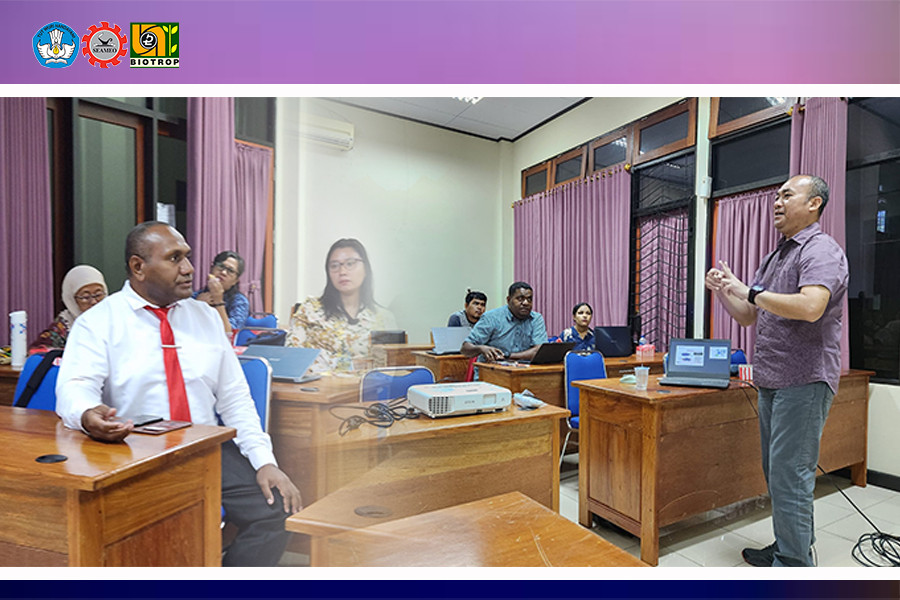SEAMEO BIOTROP collaborated with the Institute for Development and Quality Assurance at Cendrawasih University (UNCEN) in Papua on 23 August 2023 to provide a stimulating event as part of a vibrant knowledge exchange. The program featured two important themes: "Exploring Geospatial Data and Technology" and "Protected Coastal Ecosystem for Safeguarding Biodiversity and Blue Carbon." These insightful conversations were led by Director of SEAMEO BIOTROP Dr. Zulhamsyah Imran and Mr Slamet Widodo, M.Sc. 15 Members of Faculty of Mathematics and Science of UNCEN and students attended the event.
Dr. Zulhamsyah Imran, in his comprehensive presentation, addressed a pressing concern that is generating fervent discussions within academic and professional circles—the issue of the 4B's. These four "B's" signify blue economics, blue ecosystems, blue food, and blue carbon. Notably, the discourse surrounding blue carbon has gained immense significance due to its profound ties to CO2 emissions, climate change, and global as well as Indonesian biodiversity loss.
Central to climate change mitigation and adaptation efforts, the role of blue carbon cannot be overstated. Mangroves, covering a mere 2% of the world's expanse, account for an astonishing 23% of mangroves found globally. This distinct category of mangroves has earned international recognition as blue ecosystems. This designation, encompassing mangroves, seagrasses, and tidal marshes, carries far-reaching implications. Remarkably, mangroves alone are deemed capable of quantifiably absorbing and storing carbon, rendering it amenable to trading and taxation. The economic and carbon valuation attached to this ecosystem presents lucrative avenues for trading while also factoring in potential losses incurred due to degradation.
An example illustrating these potential losses can be found in Hamadi, Jayapura, where the mangrove ecosystem has been adversely impacted due to reclamation, with reported areas varying from 2 to 10 hectares. The ramifications extend beyond carbon seepage, engendering the loss of precious biodiversity. It is imperative to recognize that the carbon storage potential within mangroves is estimated to range from 2 to 5 times greater than their terrestrial counterparts.
The collaboration between SEAMEO BIOTROP and UNCEN signals a profound commitment to harnessing geospatial technology's prowess for the greater good, championing biodiversity preservation and climate change adaptation through the lens of blue carbon management.
Dr. Zulhamsyah Imran, in his comprehensive presentation, addressed a pressing concern that is generating fervent discussions within academic and professional circles—the issue of the 4B's. These four "B's" signify blue economics, blue ecosystems, blue food, and blue carbon. Notably, the discourse surrounding blue carbon has gained immense significance due to its profound ties to CO2 emissions, climate change, and global as well as Indonesian biodiversity loss.
Central to climate change mitigation and adaptation efforts, the role of blue carbon cannot be overstated. Mangroves, covering a mere 2% of the world's expanse, account for an astonishing 23% of mangroves found globally. This distinct category of mangroves has earned international recognition as blue ecosystems. This designation, encompassing mangroves, seagrasses, and tidal marshes, carries far-reaching implications. Remarkably, mangroves alone are deemed capable of quantifiably absorbing and storing carbon, rendering it amenable to trading and taxation. The economic and carbon valuation attached to this ecosystem presents lucrative avenues for trading while also factoring in potential losses incurred due to degradation.
An example illustrating these potential losses can be found in Hamadi, Jayapura, where the mangrove ecosystem has been adversely impacted due to reclamation, with reported areas varying from 2 to 10 hectares. The ramifications extend beyond carbon seepage, engendering the loss of precious biodiversity. It is imperative to recognize that the carbon storage potential within mangroves is estimated to range from 2 to 5 times greater than their terrestrial counterparts.
The collaboration between SEAMEO BIOTROP and UNCEN signals a profound commitment to harnessing geospatial technology's prowess for the greater good, championing biodiversity preservation and climate change adaptation through the lens of blue carbon management.
 Friday, 25 August 2023 on 12:53pm
Friday, 25 August 2023 on 12:53pm
